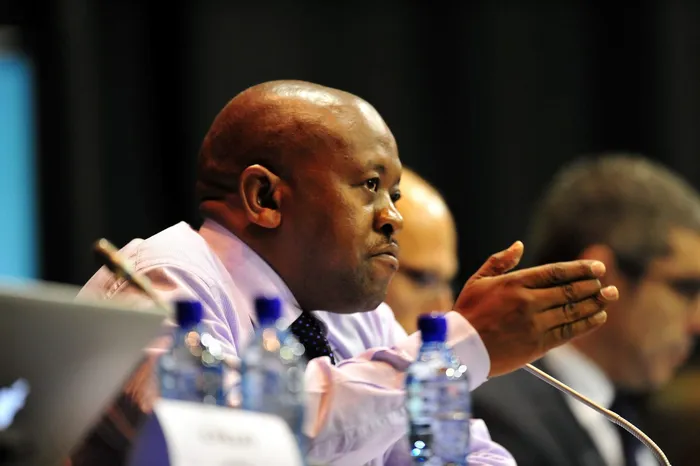Madlanga Commission delay sparks ‘cover-up’ fears

Experts and political parties say the postponement of the Commission of Inquiry into criminality and corruption within the law enforcement, chaired by recently retired Constitutional Court judge Mbuyiseli Madlanga, could lead to evidence being destroyed.
Image: Boxer Ngwenya
THE delays in starting the Madlanga Commission into criminality, political interference and corruption of law enforcement allows those implicated to interfere with evidence and intimidate witnesses.
This is according to some experts and opposition parties, who raised concerns about the impact on the safety of witnesses and whistleblowers.
On Tuesday, the Commission announced that its hearings, initially set to begin on September 1, 2025, will no longer commence on the set date.
This was due to delays in the procurement of essential infrastructure by the Department of Justice and Constitutional Development (DJCD).
This resulted in Justice and Constitutional Development Minister Mmamoloko Kubayi suspending the department’s Director-General, Advocate Doc Mashabane, and the Deputy Director-General responsible for ICT in the department, Jabu Hlatshwayo, for their lack of due diligence in ensuring that the commission starts on time.
The Commission has been tasked with probing the allegations of political interference and corruption made by KwaZulu-Natal Police Commissioner, Lieutenant-General Nhlanhla Mkhwanazi. He implicated Police Minister Senzo Mchunu as being linked with a Gauteng crime syndicate.
Crime expert and violence monitor, Mary de Haas, said even though the delay was not the commission’s fault, it will allow more time for cover-ups.
De Haas said this could also have an impact on the safety of the people who want to give evidence, especially whistleblowers.
“And we will see documentation shredded. It is easy to cover up when you have enough time to do it, especially with Information Technology (IT) services,” said Haas.
She said this is because the IT systems in the government are poor, especially in the SAPS.
“It's bad and I believe it is certainly time for something to be done with IT services in the government departments. I know because 15 years ago, you would get on the website and get reliable information and people would respond to emails. But that does not happen anymore,” De Haas said.
The sentiments were supported by founder of Forensics for Justice, Paul O’Sullivan, who said the delay favours those who may want to interfere with the evidence.
O’Sullivan said this also delays the removal of bad apples in the system.
“Lack of urgency is a problem that is symptomatic of a bloated civil service. It is not only found here, but in all walks of service delivery, due to overpaid and under qualified senior managers. The delay certainly favours those that would interfere with the evidence, but in the long run, I believe the truth will come out and the criminal justice system will be uncaptured,” he said.
Chaired by recently retired Constitutional Court judge Mbuyiseli Madlanga, the commission was established following allegations made by Mkhwanazi, who accused Mchunu and SAPS Deputy Commissioner Lt-Gen Shadrack Sibiya of colluding with organised crime syndicates and disbanding the political killings task team to undermine the work of police units.
In response to the allegations, President Cyril Ramaphosa announced the creation of the Madlanga Commission to investigate these claims.
Madlanga Commission spokesperson Jeremy Michaels said given the sensitivities with regard to safety and security of witnesses and whistleblowers, the commission would not provide details, except to say that the issue is receiving the highest priority and attention to ensure that those who want to assist are able to do so.
“The commission is focused on ensuring that all the necessary infrastructure is in place and is fully functional to enable the investigators and the legal team to continue with the critically important work of getting to the bottom of the allegations made by Mkhwanazi,” Michaels said.
DJCD spokesperson Terrence Manase did not respond to questions on the impact of the delay.
The African Transformation Movement (ATM), said the delays suggest a lack of genuine commitment to addressing the issues at hand, adding that this raises concerns about the motives behind the postponement.
“The allegations are troubling and reflect the potential for further obstruction of justice. The timing of this postponement does raise suspicions that it may facilitate attempts to undermine the integrity of the commission’s work,” said spokesperson Zama Ntshona.
The EFF said the commission’s postponement forms part of a deliberate attempt to stifle accountability.
The MK Party spokesperson Nhlamulo Ndhlela said: “The delay has created a convenient loophole for implicated individuals such as Commissioner Sibiya, who now argues that his placement on leave is unnecessary because the allegations remain untested in the absence of a sitting commission.”
Cape Times